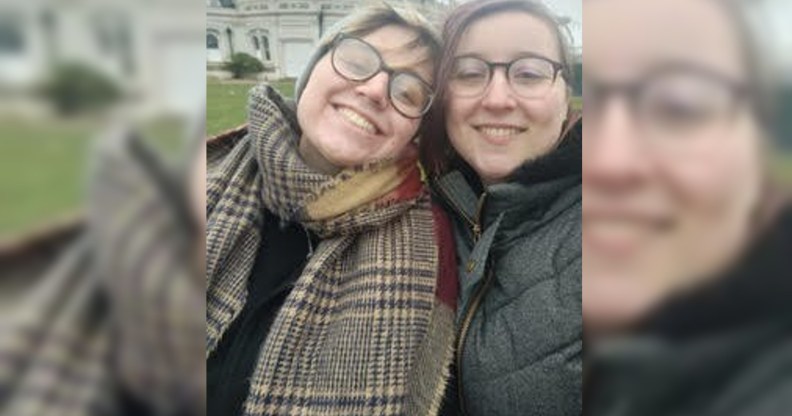‘My partner is non-binary and yes, I’m still bisexual’

Laura says the term ‘bisexual’ brings her a sense of peace. (Credit: Laura Jenkins)
As a teenager, people often assumed that I was a lesbian because I was so heavily involved in my school’s LGBT+ community.
Outside of school, family members and acquaintances would assume that I was straight because they viewed heterosexuality as the default. I don’t think anyone has ever assumed that I’m bisexual. It’s always been something that I’ve had to tell people.
I’m now in my twenties, and I’ve just moved in with my partner Eliza, who is non-binary.
One person in our circle even asked Eliza directly: “If Laura is bisexual then presumably she likes men and women… but is she allowed to like you?”
The question came from a place of genuine curiosity, yet our choices of language feel so intuitive to me that I struggle to understand why they would be confusing to someone else.
Some people who are attracted to multiple genders prefer the term pansexual, sometimes described as attraction towards people regardless of gender. This doesn’t resonate with me, as I find that gender does colour my attraction towards a person. For instance, although Eliza identified as a woman when we first became a couple, I always had a sense that this didn’t quite fit. I can’t separate my connection with Eliza as a person from my connection with Eliza as a non-binary person. To me, they are one and the same.
Gender identity isn’t just for transgender and non-binary people, nor is it only for LGBT+ individuals – all of us have a gender identity.
For instance, some lesbians identify as butch or masculine-presenting, but wouldn’t call themselves transgender or non-binary. There are other lesbians who feel a strong connection to femininity. I’ve also experienced straight, cisgender men who have a particular view of gender regarding their own masculinity.
Everyone I meet seems to have some experience of gender, a connection between how they present and how they feel, and we all have different ways of describing these connections.
‘We don’t owe an explanation for the language we choose’
Eliza is attracted to women and trans-feminine people and refers to themselves as a lesbian. They have said that “lesbian” feels like a complicated word for them to identify with, since they aren’t a woman, but that there isn’t any other word which feels right either.
But we don’t owe anyone an explanation for the language we choose to identify with, so long as we aren’t causing harm to others.
Since my partner has begun a medical transition, I’ve noticed that some people are quick to make the assumption that they are on their way to eventually identifying as a transgender man. There is an underlying assumption that transition is only for people identifying within the binary of male or female.
Eliza even found that they were required to provide additional evidence to one healthcare provider in order to qualify for gender-affirming care because they are non-binary. The idea that medical transition is only for transgender men and women implies that the goal of transition is limited to helping someone conform to one of only two options. This feeds into the same binary gender stereotypes which place limitations on bisexuality.
As The Bisexual Manifesto (1990) puts it: “We bisexuals tend to define bisexuality in ways that are unique to our own individuality. There are as many definitions of bisexuality as there are bisexuals.”
As a Just Like Us ambassador, I give talks in schools and am able to share my experience of bisexuality with young people who may be questioning their own feelings around sexual orientation and gender. I think it’s important that we offer these words to others as a method of empowerment, not as boxes which we force people to squeeze into for the sake of our own comfort.
‘The term bisexual brings me a sense of peace’
Language isn’t perfect, and inclusive language is constantly developing. In a hundred years, there may be a whole series of new words which people use to describe themselves, just as there were different words used a hundred years ago which we no longer use today.
Some people choose not to label their gender or sexuality, so as not to be confined by language. Yet for others, the language we use to describe ourselves is important. I choose to identify as bisexual because it brings me a sense of peace as the word which best describes how I feel.
There is no one way to be bisexual, and bisexual community ought to be celebrated in a way which recognises its diversity.
Laura volunteers as an ambassador for Just Like Us, the LGBT+ young people’s charity. LGBT+ and aged 18 to 25? Sign up here.
How did this story make you feel?

